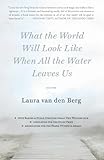 In “Where We Must Be,” the first story of Laura van den Berg’s debut collection, What the World Will Look Like When All the Water Leaves Us, a young woman, Jean, is driving north to Washington. After a wasted summer in Los Angeles, during which she failed to find acting work, she passes through one of the redwood forests in Northern California. A sign beside the road advertises, “Actors wanted,” so she leaves the highway and follows a dirt road. Stationed in the cul de sac is a mobile home that functions as an office for a man who arranges “encounters.” Tourists from around the country, Jean discovers, are willing to pay for the opportunity to get chased through the woods by Bigfoot. In a moment of desperation and humiliation, she auditions, stomping around the trailer in costume, “bellowing and shaking [her] arms.” The man hires her immediately.
In “Where We Must Be,” the first story of Laura van den Berg’s debut collection, What the World Will Look Like When All the Water Leaves Us, a young woman, Jean, is driving north to Washington. After a wasted summer in Los Angeles, during which she failed to find acting work, she passes through one of the redwood forests in Northern California. A sign beside the road advertises, “Actors wanted,” so she leaves the highway and follows a dirt road. Stationed in the cul de sac is a mobile home that functions as an office for a man who arranges “encounters.” Tourists from around the country, Jean discovers, are willing to pay for the opportunity to get chased through the woods by Bigfoot. In a moment of desperation and humiliation, she auditions, stomping around the trailer in costume, “bellowing and shaking [her] arms.” The man hires her immediately.
 “Where We Must Be,” like most of the stories in this collection, concerns a folkloric animal. The protagonists, or their loved ones, are obsessed with these monsters—the Amazon’s mapinguari, Lake Michigan’s mishegenabeg, the Congo’s mokele-mbebe—but no beasts manifest physically. We see Bigfoot, but only as a costume worn by an actor. Unlike Karen Russell’s St. Lucy’s Home for Girls Raised by Wolves, where humans interact with bizarre creatures in an otherwise literary setting, van den Berg’s freshman effort is far from a fantastical work, indexing fabulism without ever adopting its tropes completely. And this peripheral treatment of the absurd may signal a change in contemporary letters.
“Where We Must Be,” like most of the stories in this collection, concerns a folkloric animal. The protagonists, or their loved ones, are obsessed with these monsters—the Amazon’s mapinguari, Lake Michigan’s mishegenabeg, the Congo’s mokele-mbebe—but no beasts manifest physically. We see Bigfoot, but only as a costume worn by an actor. Unlike Karen Russell’s St. Lucy’s Home for Girls Raised by Wolves, where humans interact with bizarre creatures in an otherwise literary setting, van den Berg’s freshman effort is far from a fantastical work, indexing fabulism without ever adopting its tropes completely. And this peripheral treatment of the absurd may signal a change in contemporary letters.
CivilWarLand in Bad Decline arguably borrowed an aesthetic engendered by Donald Barthelme and Don DeLillo (or Gabriel Garcia Marquez, for that matter), but George Saunders’ 1997 collection repopularized the critical viability of comic fabulism in the 21st Century, setting off a string of imitators. And though there are some young, stalwart realists—Jhumpa Lahiri, and more recently, Josh Weil—for ten years the lion’s share of new books getting buzz in the literary circles have contained something outlandish. Jonathan Lethem’s Fortress of Solitude has flying children; Wells Tower’s Everything Ravaged, Everything Burned features vikings.
There isn’t anything intrinsically wrong with the fabulist trend. But in practice, a lot of the work that falls into the post-modern, ironic sub-genre lacks real weight. Simply being clever is no doubt easier than balancing ingenuity with pathos. Shakespeare’s jokes released tension, but he didn’t found his plays on them. At her best, Laura van den Berg manages to establish an equilibrium between concept and poignancy. It doesn’t appear she trained to be a realist—there aren’t a lot of camps instructing such writers these days—but she may end up a champion of the movement.
There are certainly times when What the World seems structurally transparent. Van den Berg is a well-disciplined storyteller, but in some of the stories the sum of the parts isn’t much more than the sum of the parts. She always introduces her conflict early, then provides a subplot, an accessible over-arching metaphor, and finally a turn. But in “We Are Calling to Offer You a Fabulous Life,” for instance, about a young woman working in a Manhattan mask store and sleeping with her married boss, the various planks get hammered into place but the surface doesn’t feel sanded. There’s something inorganic about the unfolding of the narrative, as if van den Berg were a politician delivering her catch phrases from the stump; she’s on message, but the tenor of the delivery lacks passion.
On the other hand, “The Rain Season,” about a woman who retreats to Africa after her house burns down in Chicago, borders on masterful. “The Rain Season” is one of six stories featuring monsters—in this case mokele-mbebe, the amphibious African jungle reptile descended, as legend has it, from the sauropod family. In the village where the narrator teaches, the monsoon season is impending, and so is civil war. The townspeople spread the rumor that mokele-mbebe has left the forest and killed a farmer, and in deference to tradition, draw the monster’s image in the soil to ward off additional invasions.
 Van den Berg does nothing specifically to exoticize the setting, but even in a book by a native African, like Uwem Akpan’s Say You’re One of Them, the sections of the continent ravaged by disease and violence are the ideal breeding grounds for magic. When the hills are full of rebel soldiers who loot, rape, and kill indiscriminately, why shouldn’t the jungle contain a creature with the head of a hippopotamus that devours children? Yet in “The Rain Season,” mokele-mbebe is not a distraction from the human story. Rather the legend is a cultural articulation of fear, and the way van den Berg handles the relationship between fable and fact is pitch perfect. In a collection that can feel at times numbed by grief and loss, “The Rain Season” rises above distress, even approaching sentimentality. Normally I’d be opposed to a story at whose core are piteous children (“The Rain Season” contains a near saccharine scene: a semi-orphaned student gives his teacher a beautiful, handmade object), but as a counterpoint to the tragedy encapsulating the rest of the tale, a little maudlin gauze feels not just permissible, but necessary.
Van den Berg does nothing specifically to exoticize the setting, but even in a book by a native African, like Uwem Akpan’s Say You’re One of Them, the sections of the continent ravaged by disease and violence are the ideal breeding grounds for magic. When the hills are full of rebel soldiers who loot, rape, and kill indiscriminately, why shouldn’t the jungle contain a creature with the head of a hippopotamus that devours children? Yet in “The Rain Season,” mokele-mbebe is not a distraction from the human story. Rather the legend is a cultural articulation of fear, and the way van den Berg handles the relationship between fable and fact is pitch perfect. In a collection that can feel at times numbed by grief and loss, “The Rain Season” rises above distress, even approaching sentimentality. Normally I’d be opposed to a story at whose core are piteous children (“The Rain Season” contains a near saccharine scene: a semi-orphaned student gives his teacher a beautiful, handmade object), but as a counterpoint to the tragedy encapsulating the rest of the tale, a little maudlin gauze feels not just permissible, but necessary.
Before the book’s release, Barnes & Noble chose What the World Will Look Like When All the Water Leaves Us for its “Discover Great New Writers” series. Undoubtedly, this is a boon for Ms. van den Berg. But more importantly, if her collection continues to gain traction, realism and sincerity, like some rough beast borne on slow thighs, may have finally reemerged from the forest. Van den Berg is writing a novel, now, and I wouldn’t be surprised if in that book she discards the surreal elements altogether. She doesn’t need them.






